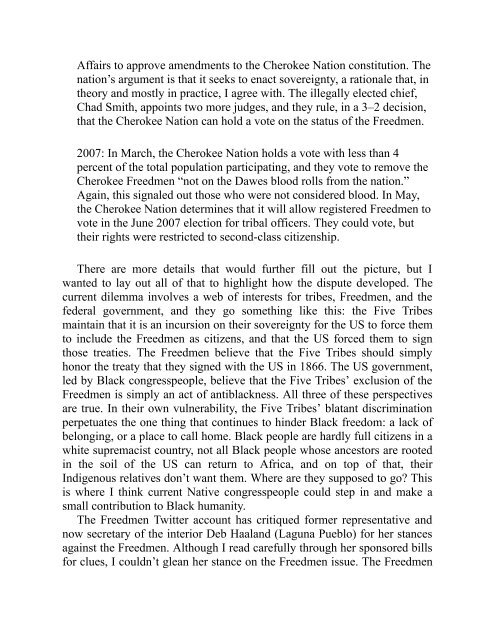Create successful ePaper yourself
Turn your PDF publications into a flip-book with our unique Google optimized e-Paper software.
Affairs to approve amendments to <strong>the</strong> Cherokee Nation constitution. The<br />
nation’s argument is that it seeks to enact sovereignty, a rationale that, in<br />
<strong>the</strong>ory and mostly in practice, I agree with. The illegally elected chief,<br />
Chad Smith, appoints two more judges, and <strong>the</strong>y rule, in a 3–2 decision,<br />
that <strong>the</strong> Cherokee Nation can hold a vote on <strong>the</strong> status <strong>of</strong> <strong>the</strong> Freedmen.<br />
2007: In March, <strong>the</strong> Cherokee Nation holds a vote with less than 4<br />
percent <strong>of</strong> <strong>the</strong> total population participating, and <strong>the</strong>y vote to remove <strong>the</strong><br />
Cherokee Freedmen “not on <strong>the</strong> Dawes blood rolls from <strong>the</strong> nation.”<br />
Again, this signaled out those who were not considered blood. In May,<br />
<strong>the</strong> Cherokee Nation determines that it will allow registered Freedmen to<br />
vote in <strong>the</strong> June 2007 election for tribal <strong>of</strong>ficers. They could vote, but<br />
<strong>the</strong>ir rights were restricted to second-class citizenship.<br />
There are more details that would fur<strong>the</strong>r fill out <strong>the</strong> picture, but I<br />
wanted to lay out all <strong>of</strong> that to highlight how <strong>the</strong> dispute developed. The<br />
current dilemma involves a web <strong>of</strong> interests for tribes, Freedmen, and <strong>the</strong><br />
federal government, and <strong>the</strong>y go something like this: <strong>the</strong> Five Tribes<br />
maintain that it is an incursion on <strong>the</strong>ir sovereignty for <strong>the</strong> US to force <strong>the</strong>m<br />
to include <strong>the</strong> Freedmen as citizens, and that <strong>the</strong> US forced <strong>the</strong>m to sign<br />
those treaties. The Freedmen believe that <strong>the</strong> Five Tribes should simply<br />
honor <strong>the</strong> treaty that <strong>the</strong>y signed with <strong>the</strong> US in 1866. The US government,<br />
led by Black congresspeople, believe that <strong>the</strong> Five Tribes’ exclusion <strong>of</strong> <strong>the</strong><br />
Freedmen is simply an act <strong>of</strong> antiblackness. All three <strong>of</strong> <strong>the</strong>se perspectives<br />
are true. In <strong>the</strong>ir own vulnerability, <strong>the</strong> Five Tribes’ blatant discrimination<br />
perpetuates <strong>the</strong> one thing that continues to hinder Black freedom: a lack <strong>of</strong><br />
belonging, or a place to call home. Black people are hardly full citizens in a<br />
white supremacist country, not all Black people whose ancestors are rooted<br />
in <strong>the</strong> soil <strong>of</strong> <strong>the</strong> US can return to Africa, and on top <strong>of</strong> that, <strong>the</strong>ir<br />
<strong>Indigenous</strong> relatives don’t want <strong>the</strong>m. Where are <strong>the</strong>y supposed to go? This<br />
is where I think current Native congresspeople could step in and make a<br />
small contribution to Black humanity.<br />
The Freedmen Twitter account has critiqued former representative and<br />
now secretary <strong>of</strong> <strong>the</strong> interior Deb Haaland (Laguna Pueblo) for her stances<br />
against <strong>the</strong> Freedmen. Although I read carefully through her sponsored bills<br />
for clues, I couldn’t glean her stance on <strong>the</strong> Freedmen issue. The Freedmen


















